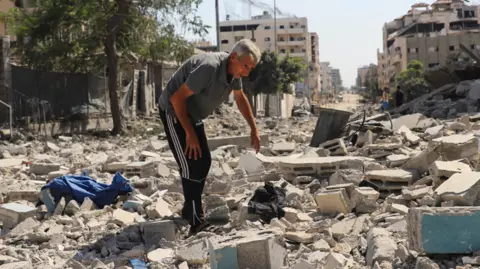Israel and Hamas begin indirect talks in Egypt on Trump’s Gaza peace plan
33 minutes agoRushdi AbualoufGaza correspondent andKathryn Armstrong

 Reuters
ReutersIndirect talks aimed at reaching a final agreement on a US peace plan to end the war in Gaza have begun in the Egyptian city of Sharm El-Sheikh.
Palestinian and Egyptian officials have told the BBC that the sessions are focused on “creating the field conditions” for a possible exchange that would see the release of all Israeli hostages in return for a number of Palestinian prisoners.
Hamas has said it agrees to the peace plan proposals in part, but has not responded to several key demands – including its disarmament and future role in Gaza.
Israel’s prime minister said on Saturday that he hoped to announce the release of hostages “in the coming days”.
The talks, which will see Egyptian and Qatari officials holding shuttle meetings with delegations from both Israel and Hamas separately, come on the eve of the second anniversary of the Hamas-led attack on southern Israel on 7 October 2023, in which about 1,200 people were killed and 251 others were taken hostage.
The Israeli military launched a campaign in Gaza in response. Since then, 67,160 have been killed by Israeli military operations in Gaza, according to the territory’s Hamas-run health ministry.
These discussions are expected to be among the most consequential since the start of the war and could determine whether a path toward ending the conflict is finally within reach.
US special envoy Steve Witkoff, Trump’s son-in-law Jared Kushner and Qatari foreign minister Sheikh Mohammed bin Abdulrahman Al Thani are among those attending.
Donald Trump, writing on social media, has urged everyone involved in efforts to end the Gaza war to “move fast” and says he has been told the first phase of the peace plan – which includes the hostage release – “should be completed this week”.
The 20-point plan, which has been agreed upon by US President Donald Trump and Israeli Prime Minister Benjamin Netanyahu, proposes an immediate end to fighting and the release of 48 hostages, only 20 of whom are thought to be alive, in exchange for hundreds of detained Gazans.
The plan stipulates that once both sides agree to the proposal “full aid will be immediately sent into the Gaza Strip”.
It also states that Hamas would have no role in governing Gaza, and it leaves the door open for an eventual Palestinian state.
However, after the plan was announced publicly a week ago, Netanyahu reinstated his longstanding opposition to a Palestinian state, saying in a video statement: “It’s not written in the agreement. We said we would strongly oppose a Palestinian state.”
On Friday, Hamas responded to the proposal in a statement, in which the group
It did not specifically mention or accept Trump’s 20-point plan but said it “renews its agreement to hand over the administration of the Gaza Strip to a Palestinian body of independents (technocrats), based on Palestinian national consensus and Arab and Islamic support.”
The statement made no mention of one of the key demands of the plan – that Hamas agree to its disarmament and to playing no further role in the governance of Gaza.
It added that the part of the proposals dealing with the future of Gaza and the rights of Palestinian people was still being discussed “within a national framework”, of which it said Hamas will be a part.
Many Palestinians described Hamas’ response to the peace plan as unexpected, after days of indications that the group was preparing to reject or at least heavily condition its acceptance of Trump’s peace plan proposal.
Instead, Hamas refrained from including its traditional “red lines” in the official statement, a move many interpret as a sign of external pressure.
European and Middle Eastern leaders have welcomed the proposal. The Palestinian Authority (PA), which governs parts of the Israeli-occupied West Bank, has called the US president’s efforts “sincere and determined”.
Iran – which has been one of Hamas’s main sponsors for many years – has also now signalled its support for Trump’s Gaza peace plan.
Israeli bombardment continued in several parts of the Gaza Strip on Monday ahead of the talks beginning.
Israel is carrying out an offensive in the city, which it has said is aimed at securing the release of the remaining hostages.
Mahmoud Basal, spokesman for Gaza’s Hamas-run civil defence, told the BBC that “no aid trucks have been allowed into Gaza City since the offensive began four weeks ago”.
“There are still bodies we cannot retrieve from areas under Israeli control,” he said.
Hundreds of thousands of Gaza City residents have been forced to flee after the Israeli military ordered evacuations to a designated “humanitarian area” in the south, but hundreds of thousands more are believed to have remained.
Israel’s defence minister has warned that those who stay during the offensive would be “terrorists and supporters of terror”.
In the last 24 hours, 21 Palestinians have been killed in Gaza and a further 96 injured, the Hamas-run health ministry said in its latest update.
International journalists have been banned by Israel from entering the Gaza Strip independently since the start of the war, making verifying claims from both sides difficult.